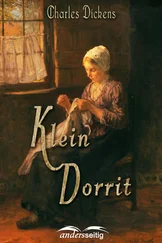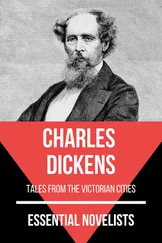Charles Dickens - Little Dorrit
Здесь есть возможность читать онлайн «Charles Dickens - Little Dorrit» весь текст электронной книги совершенно бесплатно (целиком полную версию без сокращений). В некоторых случаях можно слушать аудио, скачать через торрент в формате fb2 и присутствует краткое содержание. Жанр: Классическая проза, на английском языке. Описание произведения, (предисловие) а так же отзывы посетителей доступны на портале библиотеки ЛибКат.
- Название:Little Dorrit
- Автор:
- Жанр:
- Год:неизвестен
- ISBN:нет данных
- Рейтинг книги:3 / 5. Голосов: 1
-
Избранное:Добавить в избранное
- Отзывы:
-
Ваша оценка:
- 60
- 1
- 2
- 3
- 4
- 5
Little Dorrit: краткое содержание, описание и аннотация
Предлагаем к чтению аннотацию, описание, краткое содержание или предисловие (зависит от того, что написал сам автор книги «Little Dorrit»). Если вы не нашли необходимую информацию о книге — напишите в комментариях, мы постараемся отыскать её.
Little Dorrit — читать онлайн бесплатно полную книгу (весь текст) целиком
Ниже представлен текст книги, разбитый по страницам. Система сохранения места последней прочитанной страницы, позволяет с удобством читать онлайн бесплатно книгу «Little Dorrit», без необходимости каждый раз заново искать на чём Вы остановились. Поставьте закладку, и сможете в любой момент перейти на страницу, на которой закончили чтение.
Интервал:
Закладка:
Bleeding Heart Yard was shy of claiming that acquaintance.
'It's no matter,' said Mr Pancks, 'I merely wish to remark that the task this Proprietor has set me, has been never to leave off conjugating the Imperative Mood Present Tense of the verb To keep always at it. Keep thou always at it. Let him keep always at it. Keep we or do we keep always at it. Keep ye or do ye or you keep always at it. Let them keep always at it. Here is your benevolent Patriarch of a Casby, and there is his golden rule. He is uncommonly improving to look at, and I am not at all so. He is as sweet as honey, and I am as dull as ditch-water. He provides the pitch, and I handle it, and it sticks to me. Now,' said Mr Pancks, closing upon his late Proprietor again, from whom he had withdrawn a little for the better display of him to the Yard; 'as I am not accustomed to speak in public, and as I have made a rather lengthy speech, all circumstances considered, I shall bring my observations to a close by requesting you to get out of this.'
The Last of the Patriarchs had been so seized by assault, and required so much room to catch an idea in, an so much more room to turn it in, that he had not a word to offer in reply. He appeared to be meditating some Patriarchal way out of his delicate position, when Mr Pancks, once more suddenly applying the trigger to his hat, shot it off again with his former dexterity. On the preceding occasion, one or two of the Bleeding Heart Yarders had obsequiously picked it up and handed it to its owner; but Mr Pancks had now so far impressed his audience, that the Patriarch had to turn and stoop for it himself.
Quick as lightning, Mr Pancks, who, for some moments, had had his right hand in his coat pocket, whipped out a pair of shears, swooped upon the Patriarch behind, and snipped off short the sacred locks that flowed upon his shoulders. In a paroxysm of animosity and rapidity, Mr Pancks then caught the broad-brimmed hat out of the astounded Patriarch's hand, cut it down into a mere stewpan, and fixed it on the Patriarch's head.
Before the frightful results of this desperate action, Mr Pancks himself recoiled in consternation. A bare-polled, goggle-eyed, big-headed lumbering personage stood staring at him, not in the least impressive, not in the least venerable, who seemed to have started out of the earth to ask what was become of Casby. After staring at this phantom in return, in silent awe, Mr Pancks threw down his shears, and fled for a place of hiding, where he might lie sheltered from the consequences of his crime. Mr Pancks deemed it prudent to use all possible despatch in making off, though he was pursued by nothing but the sound of laughter in Bleeding Heart Yard, rippling through the air and making it ring again.
CHAPTER 33
Going!
The changes of a fevered room are slow and fluctuating; but the changes of the fevered world are rapid and irrevocable.
It was Little Dorrit's lot to wait upon both kinds of change. The Marshalsea walls, during a portion of every day, again embraced her in their shadows as their child, while she thought for Clennam, worked for him, watched him, and only left him, still to devote her utmost love and care to him. Her part in the life outside the gate urged its pressing claims upon her too, and her patience untiringly responded to them. Here was Fanny, proud, fitful, whimsical, further advanced in that disqualified state for going into society which had so much fretted her on the evening of the tortoise-shell knife, resolved always to want comfort, resolved not to be comforted, resolved to be deeply wronged, and resolved that nobody should have the audacity to think her so. Here was her brother, a weak, proud, tipsy, young old man, shaking from head to foot, talking as indistinctly as if some of the money he plumed himself upon had got into his mouth and couldn't be got out, unable to walk alone in any act of his life, and patronising the sister whom he selfishly loved (he always had that negative merit, ill-starred and ill-launched Tip!) because he suffered her to lead him. Here was Mrs Merdle in gauzy mourning—the original cap whereof had possibly been rent to pieces in a fit of grief, but had certainly yielded to a highly becoming article from the Parisian market—warring with Fanny foot to foot, and breasting her with her desolate bosom every hour in the day. Here was poor Mr Sparkler, not knowing how to keep the peace between them, but humbly inclining to the opinion that they could do no better than agree that they were both remarkably fine women, and that there was no nonsense about either of them—for which gentle recommendation they united in falling upon him frightfully. Then, too, here was Mrs General, got home from foreign parts, sending a Prune and a Prism by post every other day, demanding a new Testimonial by way of recommendation to some vacant appointment or other. Of which remarkable gentlewoman it may be finally observed, that there surely never was a gentlewoman of whose transcendent fitness for any vacant appointment on the face of this earth, so many people were (as the warmth of her Testimonials evinced) so perfectly satisfied—or who was so very unfortunate in having a large circle of ardent and distinguished admirers, who never themselves happened to want her in any capacity.
On the first crash of the eminent Mr Merdle's decease, many important persons had been unable to determine whether they should cut Mrs Merdle, or comfort her. As it seemed, however, essential to the strength of their own case that they should admit her to have been cruelly deceived, they graciously made the admission, and continued to know her. It followed that Mrs Merdle, as a woman of fashion and good breeding who had been sacrificed to the wiles of a vulgar barbarian (for Mr Merdle was found out from the crown of his head to the sole of his foot, the moment he was found out in his pocket), must be actively championed by her order for her order's sake. She returned this fealty by causing it to be understood that she was even more incensed against the felonious shade of the deceased than anybody else was; thus, on the whole, she came out of her furnace like a wise woman, and did exceedingly well.
Mr Sparkler's lordship was fortunately one of those shelves on which a gentleman is considered to be put away for life, unless there should be reasons for hoisting him up with the Barnacle crane to a more lucrative height. That patriotic servant accordingly stuck to his colours (the Standard of four Quarterings), and was a perfect Nelson in respect of nailing them to the mast. On the profits of his intrepidity, Mrs Sparkler and Mrs Merdle, inhabiting different floors of the genteel little temple of inconvenience to which the smell of the day before yesterday's soup and coach-horses was as constant as Death to man, arrayed themselves to fight it out in the lists of Society, sworn rivals. And Little Dorrit, seeing all these things as they developed themselves, could not but wonder, anxiously, into what back corner of the genteel establishment Fanny's children would be poked by-and-by, and who would take care of those unborn little victims.
Arthur being far too ill to be spoken with on subjects of emotion or anxiety, and his recovery greatly depending on the repose into which his weakness could be hushed, Little Dorrit's sole reliance during this heavy period was on Mr Meagles. He was still abroad; but she had written to him through his daughter, immediately after first seeing Arthur in the Marshalsea and since, confiding her uneasiness to him on the points on which she was most anxious, but especially on one. To that one, the continued absence of Mr Meagles abroad, instead of his comforting presence in the Marshalsea, was referable.
Without disclosing the precise nature of the documents that had fallen into Rigaud's hands, Little Dorrit had confided the general outline of that story to Mr Meagles, to whom she had also recounted his fate. The old cautious habits of the scales and scoop at once showed Mr Meagles the importance of recovering the original papers; wherefore he wrote back to Little Dorrit, strongly confirming her in the solicitude she expressed on that head, and adding that he would not come over to England 'without making some attempt to trace them out.'
Читать дальшеИнтервал:
Закладка:
Похожие книги на «Little Dorrit»
Представляем Вашему вниманию похожие книги на «Little Dorrit» списком для выбора. Мы отобрали схожую по названию и смыслу литературу в надежде предоставить читателям больше вариантов отыскать новые, интересные, ещё непрочитанные произведения.
Обсуждение, отзывы о книге «Little Dorrit» и просто собственные мнения читателей. Оставьте ваши комментарии, напишите, что Вы думаете о произведении, его смысле или главных героях. Укажите что конкретно понравилось, а что нет, и почему Вы так считаете.












